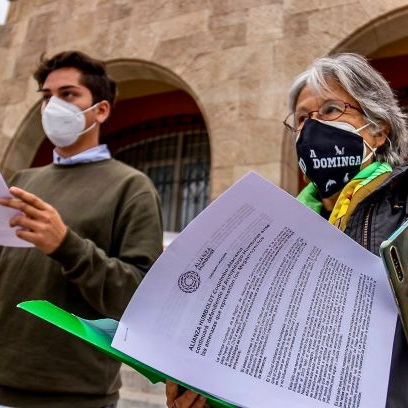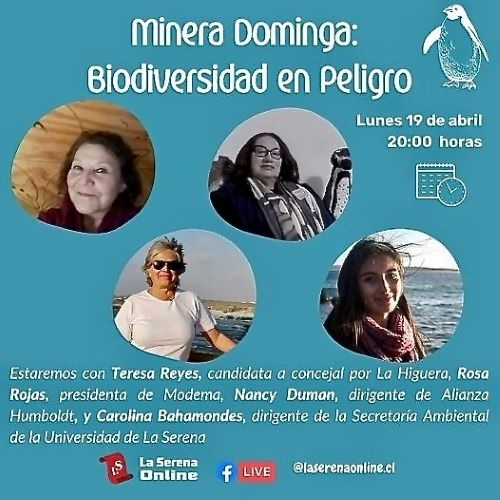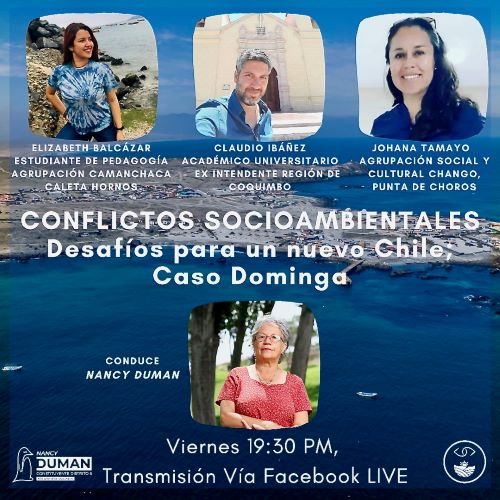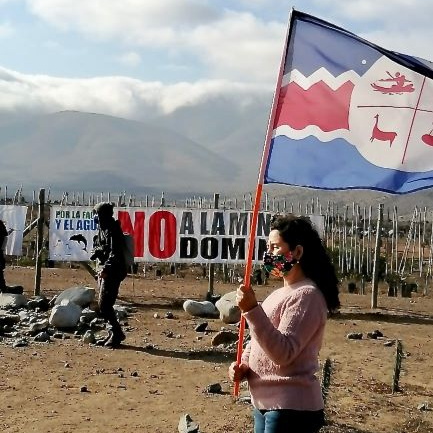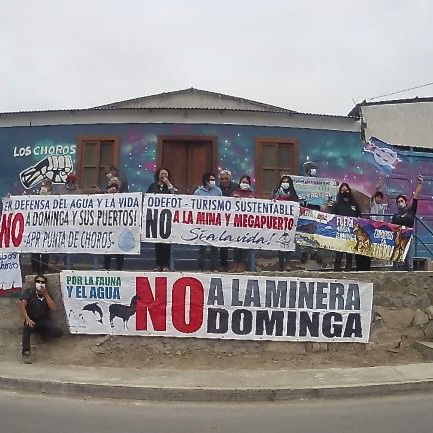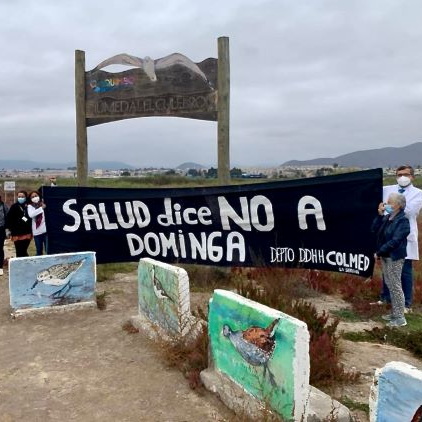Landau 25 April 2021.
You don't know if you should laugh or cry. The April 16th, 2021 decision of the Antofagasta Environmental Court on the “Dominga” mining and port project is reminiscent of absurd theater. In 2017, the Regional Government of Coquimbo and the Committee of Ministers (1) rejected the "Dominga" project. Andes Iron appealed against the decisions to the Antofagasta Environmental Court. The company Andes Iron filed a complaint against the decisions with the Antofagasta Environmental Court and was proven right. Environmentalists successfully challenged this ruling before the Supreme Court in Santiago at the end of February, beginning of March 2019. In its explanatory statement at the time, the Supreme Court stated that most of the arguments put forward by the critics of the project were valid. The Court then referred the case back to the Environmental Court in Antofagasta, asking it to consider the actual conditions of the project and the technical counterarguments. In March 2020, the dispute was again heard and decided in Antofagasta. However, the court has only now published its verdict on April 16, 2021. A whole year later!!?? Once again, the court ruled in favor of Andes Iron and ordered a new vote in the Coquimbo Regional Environmental Assessment Commission. In a statement, Alianza Humboldt (2), of which SPHENISCO is a member, criticized the decision and shed light on the prospects of the lawsuit.
Declaration of 21 April 2021
La Serena 21 April 2021. The ALIANZA HUMBOLDT Coquimbo-Atacama will continue to defend the Humboldt Archipelago against threats from megaprojects.
The Alianza Humboldt of the Atacama and Coquimbo region urges all citizens of civil society, individuals, organizations and institutions to join it in defending the Humboldt Archipelago and its surroundings against the dangers posed by such projects.
On Friday, April 16th, the Antofagasta Environmental Court upheld the suit brought by Andes Iron on the "Dominga" mining and port project. In its decision, the court ordered a new vote in the Coquimbo Environmental Assessment Commission. At the same time, the Court acknowledged that the envisaged project had serious problems and that the explanations were insufficient. However, according to the court, these shortcomings could be resolved by the Committee of Ministers. With this proposal, the Court of First Instance exceeded its authority. It is not empowered to propose to the Committee of Ministers that it fix the problems of the "Dominga" project. Its mission is to enforce compliance with environmental laws and to ensure that projects are properly evaluated, and that evaluations are not influenced by private interests.
The judgment of April 16th is once again a reminder that legal and institutional measures in Chile are inadequate, especially when it is a case involving President Piñera himself. In 2010, he rejected the Barrancones Project (construction of coal-fired power plants) and promised to protect the Humboldt Archipelago, a nature reserve of global importance. Soon after, it was announced that up until December of the same year, he was the majority shareholder of Andes Iron, the same company pushing the Dominga project. The owner of the company was Carlos Délano, a childhood friend of Sebastian Piñera. Mr. Délano was sentenced to 99 hours of ethics lessons for illegal political party financing. It is clear to us that in this context of the current deep crisis, in the context of corruption and manipulation, we cannot enforce the law against interests that advocate the exploitation of natural resources. It is therefore necessary to mobilize the environmental movement and to consolidate its networks in order to:
- make visible the real extent of the social and environmental damage that would be associated with the realization of the 'Dominga' megaproject.
- understand the shortcomings and major errors that would have been made in the environmental assessment process, and
- ensure the protection of the environment in the Constitution.
It is worrying that the Antofagasta Environmental Court is grossly neglecting its central task, namely the protection of the natural heritage, and, with its judgment in this case, placing particular interests above the collective interest. The Court thus damages institutions and even the legal system in Chile in this matter by depriving the SEIA (Sistema de Evaluación de Impacto Ambiental), i.e., the system of environmental impact assessment, of its task. All this is happening in the context of the climate crisis and the health crisis triggered by the pandemic, and without taking into account the myriad calls from science and various international organizations to give priority to protecting and caring for the remaining ecosystems over an economy geared toward the exploitation of natural resources, thus causing so much damage to communities, the area and the local economy in general. This is especially true in the case of this globally UNIQUE ECOSYSTEM.
About the Verdict
The ruling does not mean that the project has been approved. Environmental courts have neither the power nor the competence to approve or reject a project. This is exclusively the task of other institutions responsible for the environment, such as the regional commission in charge of the environmental impact assessment.
The court accepted the complaint of Andes Iron on the megaproject "Dominga" and has now ordered that the procedure be referred back to the regional commission for re-voting. In this way, the Court opens up the possibility of irreversibly damaging the environment of this region and of creating a new 'victim zone'.
In complete contradiction to this decision, the Court of First Instance acknowledges in its judgment that the project is flawed, that it has informational deficits and concludes that the Environment Agency should have been pushing harder for improvements to the project in order to avoid rejection. For example, the Court acknowledges that the compensation measure submitted by the company with regard to the Humboldt Penguin is not appropriate and sees weaknesses in the environmental assessment procedure with regard to the impairment of the Humboldt Penguin on the island of Totoralillo Norte. However, despite the apparent lack of information and the problematic compensatory measures, it has been ordered to vote again on the project.
Impact on the Local Economy
In the area of the Humboldt Archipelago are the most productive Áreas de Manejo y Explotación de Recursos Bentónicos (AMERB) of the entire northern central zone (protected zones sustainably harvested by local fishermen) located. When this economic activity began in the 1990s, about 90 thousand units were harvested; today, with sustainable management of the areas, it is 800 thousand units.
If the megaproject were to be implemented, it would have serious consequences for the local economy, for sustainable economic activities such as local fishing, the production of olives and olive oil, family gardens, livestock farming and tourism. It should be noted that tourism has developed the strongest dynamism in recent decades and has become an important engine for the economy.
It is a very bad sign that a project aimed at exploiting natural resources is being pursued while Chile is in the process of creating a new constitution; a constitution aimed at ensuring the transition to a society with an economy that centers on the well-being of the people, the protection of the environment and not on commercial benefits. Apparently, in the interests of large corporations, those responsible want to secure everything quickly before the country's constitution and vision change.
As Alianza, we reaffirm our commitment to take all necessary measures and to use all institutional channels, nationally and internationally, to achieve the protection of the Humboldt Archipelago without mega-projects, thereby protecting this world heritage in the long term.
For all these reasons, and in view of the fact that pressure and manipulation in favor of the Dominga project are extremely strong, we reiterate the call to join the Alianza Humboldt in order to create a strong national movement to defend this national protected area.
The Alianza Humboldt was wide awake, and reacted immediately in the difficult conditions of the pandemic going on the offensive in the days after the verdict. The "Declaration of April 21" was published at press conferences in La Serena and Coquimbo, as well as on social media. A motorcade in Punta de Choros and Choros was organized. As spokeswoman for Alianza Humboldt and as an independent candidate for the Constituent Assembly, Nancy Duman conducted several daily discussions and interviews with opinion leaders on the internet. Members such as Oceana, FIMA (an environmental attorneys’ group in Chile) and the fishermen of La Higuera were also critical on social media and posted their own statements. The Medical Association of La Serena and the National Board of the Changos (Indigenous Group) also went public. Several internet newspapers took critical positions. The local newspaper, El Dia – as expected– one-sidedly presented only the view of the company Andes Iron and the project "Dominga".
On May 3rd, the Alianza Humboldt is planning a protest rally from Chañaral to La Serena via the (coastal) villages of Punta de Choros, Los Choros, and Caleta Hornos. On May 4th, the Alliance, represented by Oceana, will apply to the Corte Suprema (Supreme Court) in Santiago for the court's decision to be overturned.
W.K.
translated by Erich Greiner
Notes.
(1) Minister for Mining, Health, Agriculture, Environment and Economy
(2) The Alianza Humboldt members comprise 20 "major" organizations, among others: Oceana, Greenpeace, Ocean Blue, Sea Shepherd, Fundación Terram, FIMA, Defensa Ambiental IV Region, Modema, Turismo Caleta Hornos and Sphenisco. In addition to these organizations, there are 67 regional and other 8 supra-regional civil society organizations.
Click to enlarge:



